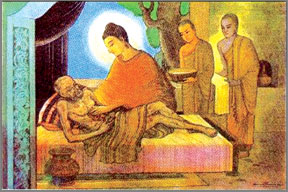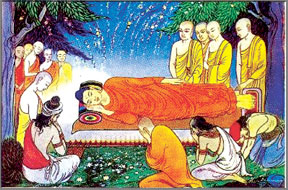The life of the Buddha
His return to Kapilavastu and His Passing Away:
Seven years after He left his native city, the Buddha decided to
return to Kapilavastu. King Suddhodhana had not yet forgiven his son for
the “Great Departure,” which had caused him such disappointment.
Suddhodhana even reproached his son for degrading himself as a beggar in
his hometown in front of everybody.
When the Buddha paid a visit to His father’s house, Yasodhara, His
former wife, adorned with all her jewels pushed Rahula, now aged eight,
to Him, saying: “Rahula, that is your father. Go and ask Him for your
inheritance!” Little Rahula did as he was told.
He greeted the Buddha politely, and waited until his father had left
the house without giving any direct answer. Then Rahula followed Him
with these words: “Father, give me my inheritance!” The Buddha’s
reaction was as dignified as it was effective. He instructed His chief
disciple Sariputra to ordain the boy as a novice, saying: “This is your
inheritance.”
Plots to kill Him
Toward the end of His life, the monk Devadatta, His cousin, watched
the Buddha aging great interest and decided to takeover the control of
the Order as His successor.
|

Tending to an ailing monk |
Devadatta had the courage not to pursue his aim solely by trickery,
but to announce it openly. The Buddha never allowed him to do so.
This made Devadatta His enemy. Devadatta, who was humiliated in
public, planned a series of plots to kill the Buddha. The third attempt
on the Buddha’s life took place within the city of Rajagaha. Devadatta
bribed certain mahouts with promises to let the working elephant
Nalagiri loose against the Buddha.
The mighty elephant, which had already killed one person, stormed
through the streets on the exact path along which the Buddha was coming
on His round to collect alms.
Throwing away a person with his trunk, the brute rushed at the
yellow-robed Buddha who, unafraid, glowed with loving kindness towards
the animal. Then the miracle took place!
Suddenly the raging elephant became calm and peaceful, and knelt
before the Buddha, who lifted His right hand and patted the animal’s
forehead. This is the well-known story of the Buddha’s defeat of a mad
elephant in Rajagaha. At age 80 the Buddha was weary and not in a good
physical condition:
“I am now old, and full of years; my journey is done and I have
reached my sum of days; I am turning eighty years of age. And just as a
worn-out cart is kept going with the help of repairs, so it seems is the
Tathagata’s body kept going with repairs”.
Parinibbana
With an untiring enthusiasm for teaching, however, the Buddha decided
to get on another long preaching journey. After passing through a number
of villages, the Buddha proceeded to a place called Pava where He and
His disciples were invited to dinner by a lowly blacksmith, Chunda.
|

The Great Passing Away |
After the meal, however, the Buddha, who was already in a weakened
condition, became seriously ill. In spite of the severe pains, the
Buddha insisted upon continuing His preaching tour, and soon ended up in
a small village called Kushinagara. By this time the Buddha was too
exhausted to go on and wanted to lie down.
The monk Ananda prepared a resting-place for Him between two
blossoming sal trees. Then Ananda, who was struck by grief, lent against
a door and wept. The Buddha called for him and explained: “Enough,
Ananda, do not sorrow, do not lament. Have I not explained that it is
the nature of things that we must be divided, separated, and parted from
all that is beloved and dear?
How could it be, Ananda, that what has been born and come into being,
that what is compounded and subject to decay, should not decay? It is
not possible”.
The Buddha told Ananda to make His impending death known to the
people in Kushinagara so that they could prepare His funeral. At that
time, a wandering ascetic named Subhadda came to see the Buddha, but was
sent away by Ananda who tried to prevent the exhausted old master from
being disturbed.
But the Buddha, who overheard the conversation, asked the ascetic to
approach His side and, after answering his questions on the Law,
accepted Him into the Order. Thereby Subhadda became the last person to
be accepted to the Order in the Buddha’s lifetime.
Then the Buddha gave the surrounding monks a last opportunity to
question Him about the Law: “Ask, monks, in case you afterwards feel
remorse, thinking: “We sat face to face with the Master, and yet we
failed to ask Him personally.”
The Buddha asked this three times, but the monks remained silent.
Then the Buddha gave them one more chance: if they did not dare to speak
out of respect for Him, they should ask through a fellow-monk. Again the
monks remained silent. It was evident that He had explained everything
very clearly to them.
The night was far advanced, and it was quiet between the trees when
the dying teacher gave the monks His last words: “Now, monks, I declare
to you: all elements of personality are subject to decay. Strive on
untiringly”! With these words He Passed Away.
Fact file
* The father of Prince Siddhartha was King Suddhodhana and mother was
Queen Mahamaya.
* The wife of Prince Siddhartha was Yasodhara and his son was Rahula.
* Prince Siddhartha left his palace when he was aged 29.
* The Buddha preached Buddhism for 45 years before He passed away at
the age of 80.
* The two main assistant Bhikkus of the Buddha were Sariputta Thera
and Mugalan Thera, while Ananda Thera was the helper.
Compiled by Janani Amarasekera
|
